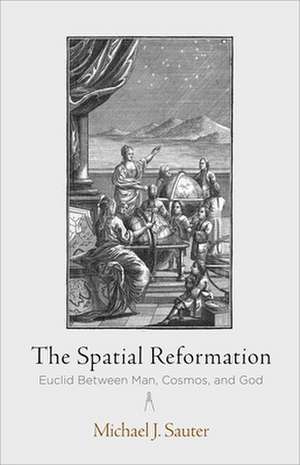The Spatial Reformation – Euclid Between Man, Cosmos, and God: Intellectual History of the Modern Age
Autor Michael J. Sauteren Limba Engleză Hardback – 10 ian 2019
The Spatial Reformation contends that space is a human construct: that is, it is a concept that arises from the human imagination and gets expressed physically in texts and material objects. Sauter begins his examination by demonstrating how Euclidean geometry, when it was applied fully to the cosmos, estranged God from man, enabling the breakthrough to heliocentrism and, by extension, the discovery of the New World. Subsequent chapters provide detailed analyses of the construction of celestial and terrestrial globes, Albrecht Drer's engraving Melencolia, the secularization of the natural history of the earth and man, and Hobbes's rejection of Euclid's sense of space and its effect on his political theory. Sauter's exploration culminates in the formation of a new anthropology in the eighteenth century that situated humanity in reference to spaces and places that human eyes had not actually seen. The Spatial Reformation illustrates how these disparate advancements can be viewed as resulting expressly from early modernity's embrace of Euclidean geometry.
Din seria Intellectual History of the Modern Age
-
 Preț: 185.35 lei
Preț: 185.35 lei -
 Preț: 243.50 lei
Preț: 243.50 lei -
 Preț: 330.24 lei
Preț: 330.24 lei - 11%
 Preț: 443.05 lei
Preț: 443.05 lei -
 Preț: 198.00 lei
Preț: 198.00 lei -
 Preț: 203.03 lei
Preț: 203.03 lei - 11%
 Preț: 474.94 lei
Preț: 474.94 lei - 11%
 Preț: 502.86 lei
Preț: 502.86 lei -
 Preț: 466.13 lei
Preț: 466.13 lei - 11%
 Preț: 441.89 lei
Preț: 441.89 lei - 11%
 Preț: 624.77 lei
Preț: 624.77 lei -
 Preț: 464.00 lei
Preț: 464.00 lei -
 Preț: 313.45 lei
Preț: 313.45 lei - 23%
 Preț: 427.99 lei
Preț: 427.99 lei - 5%
 Preț: 426.73 lei
Preț: 426.73 lei - 9%
 Preț: 683.85 lei
Preț: 683.85 lei - 23%
 Preț: 526.63 lei
Preț: 526.63 lei - 23%
 Preț: 527.93 lei
Preț: 527.93 lei - 23%
 Preț: 524.72 lei
Preț: 524.72 lei - 23%
 Preț: 489.49 lei
Preț: 489.49 lei - 23%
 Preț: 427.99 lei
Preț: 427.99 lei - 23%
 Preț: 464.27 lei
Preț: 464.27 lei
Preț: 562.11 lei
Preț vechi: 631.58 lei
-11% Nou
Puncte Express: 843
Preț estimativ în valută:
107.59€ • 113.04$ • 90.42£
107.59€ • 113.04$ • 90.42£
Carte tipărită la comandă
Livrare economică 12-26 martie
Preluare comenzi: 021 569.72.76
Specificații
ISBN-13: 9780812250664
ISBN-10: 0812250664
Pagini: 344
Dimensiuni: 168 x 242 x 30 mm
Greutate: 0.73 kg
Editura: MT – University of Pennsylvania Press
Seria Intellectual History of the Modern Age
ISBN-10: 0812250664
Pagini: 344
Dimensiuni: 168 x 242 x 30 mm
Greutate: 0.73 kg
Editura: MT – University of Pennsylvania Press
Seria Intellectual History of the Modern Age
Cuprins
Preface
Introduction. The Spatial Reformation
Chapter 1. From Sacred Texts to Secular Space
Chapter 2. The Renaissance and the Round Ball
Chapter 3. Divine Melancholy
Chapter 4. Eden's End
Chapter 5. Modest Ravings
Chapter 6. Strangers to the World
Conclusion. Prosaic Reflections
Notes
Bibliography
Index
Acknowledgments
Notă biografică
Descriere
The Spatial Reformation offers a sweeping history of the way Europeans conceived of three-dimensional space, between 1350 and 1850, and calls for a deliberate reconsideration not only of what constitutes the intellectual foundation of the early modern era but also of its temporal range.
